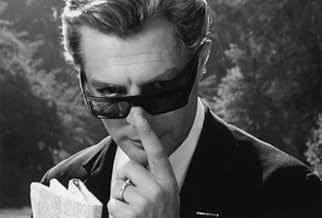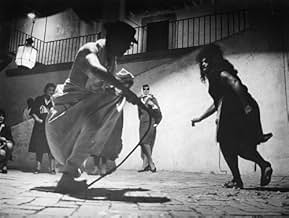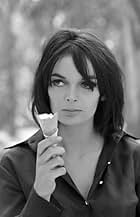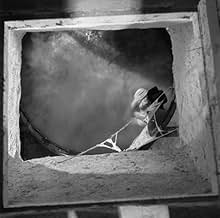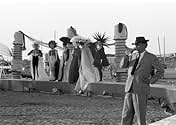Un regista cinematografico tormentato si ritira tra i suoi ricordi e le sue fantasie.Un regista cinematografico tormentato si ritira tra i suoi ricordi e le sue fantasie.Un regista cinematografico tormentato si ritira tra i suoi ricordi e le sue fantasie.
- Regia
- Sceneggiatura
- Star
- Vincitore di 2 Oscar
- 19 vittorie e 9 candidature totali
Anouk Aimée
- Luisa Anselmi
- (as Anouk Aimee)
Eddra Gale
- La Saraghina
- (as Edra Gale)
Recensioni in evidenza
Fellini's 8 1/2 opens with a stunning dream sequence in which a man is trapped in his car in the middle of a traffic jam. The doors and windows are locked and there is no escape. Other drivers simply sit and stare at him passively. The driver starts to panic as smoke begins to build up within the car. Propelling himself outside a window, he floats over the other cars and soars above the world until he is pulled down a rope attached to a tether on his ankle. The driver is Guido Anselmi (Marcello Mastroianni), a film director at odds with himself. Shot in black and white, 8 1/2 is an exhilarating, confusing, irritating, and inspired journey into a man's consciousness. It is not just a look at the inner turmoil of one person, but also a commentary on each person's struggle to make sense of their life. The film's combination of kaleidoscopic images, evocative score by Nino Rota, and amazing performances ensure its place as one of the greatest films of the century.
Guido is preparing to shoot a new film with an expensive budget. He constructs a huge spaceship launch pad that costs $80 million but he is unsure of what he wants to say. Guido's dishonesty in dealing with his marriage, his career, and the fact that he really does not want to make the film forces him to falsely mislead people as to his true intentions. He feels like a failure and is physically spent. He checks into a spa to restore his health and well being but the contingent of producers, actors, writers, and hangers on undermine his strength. His feeling of being overwhelmed by personal and professional obligations provides the catalyst for dreams and fantasies that take him back to his childhood.
Fellini shows his encounter with the prostitute Saraghina (Eddra Gale) and the guilt he has to deal with in a confrontation with the Catholic Church. Guido invites his intellectual wife Luisa (Anouk Aimée) to the set but their relationship has turned cold and passionless, and sparks fly when she has to confront Carla (Sandra Milo), his buxom mistress. Guido is misguided but he has an innocence and charm that allows us to overlook his indulgences. He enjoys his pleasures but has a conscience and feels guilty about cheating on Luisa whom he loves and is afraid of losing. He fantasizes that all of the women in his life are together in a harem where they all dote on his every whim. When they finally recognize how little he cares about them, he is forced to suppress their revolt.
As image piles on image and the fantasy becomes indistinguishable from the reality, the viewer may get lost in a maze of dazzling incoherence. Fellini, however, always returns to solid ground and the film offers not only a satire on the frenzy, the uncertainty, and the clash of egos involved with making a film but also a serious commentary on the importance of honesty in a relationship. If 8 1/2 is occasionally exhausting, the ending is invigorating, letting us know that life is a game in which each of us is on the stage performing our roles and the only sane response to its turmoil is to join hands in love and celebrate the moment.
Guido is preparing to shoot a new film with an expensive budget. He constructs a huge spaceship launch pad that costs $80 million but he is unsure of what he wants to say. Guido's dishonesty in dealing with his marriage, his career, and the fact that he really does not want to make the film forces him to falsely mislead people as to his true intentions. He feels like a failure and is physically spent. He checks into a spa to restore his health and well being but the contingent of producers, actors, writers, and hangers on undermine his strength. His feeling of being overwhelmed by personal and professional obligations provides the catalyst for dreams and fantasies that take him back to his childhood.
Fellini shows his encounter with the prostitute Saraghina (Eddra Gale) and the guilt he has to deal with in a confrontation with the Catholic Church. Guido invites his intellectual wife Luisa (Anouk Aimée) to the set but their relationship has turned cold and passionless, and sparks fly when she has to confront Carla (Sandra Milo), his buxom mistress. Guido is misguided but he has an innocence and charm that allows us to overlook his indulgences. He enjoys his pleasures but has a conscience and feels guilty about cheating on Luisa whom he loves and is afraid of losing. He fantasizes that all of the women in his life are together in a harem where they all dote on his every whim. When they finally recognize how little he cares about them, he is forced to suppress their revolt.
As image piles on image and the fantasy becomes indistinguishable from the reality, the viewer may get lost in a maze of dazzling incoherence. Fellini, however, always returns to solid ground and the film offers not only a satire on the frenzy, the uncertainty, and the clash of egos involved with making a film but also a serious commentary on the importance of honesty in a relationship. If 8 1/2 is occasionally exhausting, the ending is invigorating, letting us know that life is a game in which each of us is on the stage performing our roles and the only sane response to its turmoil is to join hands in love and celebrate the moment.
Frederico Fellini's masterwork 8 ½ is difficult to approach largely because of its reputation. Many critics also state that the film is so complex that it requires multiple viewings to understand, and this is likely to intimidate many viewers. But in truth, and in spite of its surrealistic flourishes, 8 ½ is more straight-forward than its reputation might lead you to believe.
The storyline itself is very simple. A famous director is preparing a new film, but finds himself suffering from creative block: he is obsessed by, loves, and feels unending frustration with both art and women, and his attention and ambition flies in so many different directions that he is suddenly incapable of focusing on one possibility lest he negate all others. With deadlines approaching the cast and crew descend upon him demanding information about the film--information that the director does not have because he finds himself incapable of making an artistic choice.
What makes the film interesting is the way in which Fellini ultimately transforms the film as a whole into a commentary on the nature of creativity, art, mid-life crisis, and the battle of the sexes. Throughout the film, the director dreams dreams, has fantasies, and recalls his childhood--and this internal life is presented on the screen with the same sense of reality as reality itself. The staging of the various shots is unique; one is seldom aware that the characters have slipped into a dream, fantasy, or memory until one is well into the scene, and as the film progresses the lines between external life and internal thought become increasingly blurred, with Fellini giving as much (if not more) importance to fantasy as to fact.
The performances and the cinematography are key to the film's success. Even when the film becomes surrealistic, fantastic, the actors perform very realistically and the cinematography presents the scene in keeping with what we understand to be the reality of the characters lives and relationships. At the same time, however, the film has a remarkably poetic quality, a visual fluidity and beauty that transforms even the most ordinary events into something slightly tinged by a dream-like quality. Marcello Mastroianni offers a his greatest performance here, a delicate mixture of desperation and ennui, and he is exceptionally well supported by a cast that includes Claudia Cardinale, Anouk Aimee, and a host of other notables.
I would encourage people not to be intimidated by the film's reputation, for its content can be quickly grasped. When critics state the film requires repeated viewing what they actually seem to mean is that the film holds up extremely well to repeated viewing; each time it is seen, one finds more and more to enjoy and to contemplate. Even so, I would be amiss if I did not point out that people who prefer a cinema of tidy plot lines and who dislike ambiguity or the necessity of interpreting content will probably dislike 8 ½ a great deal. For all others: strongly, strongly recommended.
Gary F. Taylor, aka GFT, Amazon Reviewer
The storyline itself is very simple. A famous director is preparing a new film, but finds himself suffering from creative block: he is obsessed by, loves, and feels unending frustration with both art and women, and his attention and ambition flies in so many different directions that he is suddenly incapable of focusing on one possibility lest he negate all others. With deadlines approaching the cast and crew descend upon him demanding information about the film--information that the director does not have because he finds himself incapable of making an artistic choice.
What makes the film interesting is the way in which Fellini ultimately transforms the film as a whole into a commentary on the nature of creativity, art, mid-life crisis, and the battle of the sexes. Throughout the film, the director dreams dreams, has fantasies, and recalls his childhood--and this internal life is presented on the screen with the same sense of reality as reality itself. The staging of the various shots is unique; one is seldom aware that the characters have slipped into a dream, fantasy, or memory until one is well into the scene, and as the film progresses the lines between external life and internal thought become increasingly blurred, with Fellini giving as much (if not more) importance to fantasy as to fact.
The performances and the cinematography are key to the film's success. Even when the film becomes surrealistic, fantastic, the actors perform very realistically and the cinematography presents the scene in keeping with what we understand to be the reality of the characters lives and relationships. At the same time, however, the film has a remarkably poetic quality, a visual fluidity and beauty that transforms even the most ordinary events into something slightly tinged by a dream-like quality. Marcello Mastroianni offers a his greatest performance here, a delicate mixture of desperation and ennui, and he is exceptionally well supported by a cast that includes Claudia Cardinale, Anouk Aimee, and a host of other notables.
I would encourage people not to be intimidated by the film's reputation, for its content can be quickly grasped. When critics state the film requires repeated viewing what they actually seem to mean is that the film holds up extremely well to repeated viewing; each time it is seen, one finds more and more to enjoy and to contemplate. Even so, I would be amiss if I did not point out that people who prefer a cinema of tidy plot lines and who dislike ambiguity or the necessity of interpreting content will probably dislike 8 ½ a great deal. For all others: strongly, strongly recommended.
Gary F. Taylor, aka GFT, Amazon Reviewer
I know this film is loved and admired by countless filmmakers and fans. I know that the film is very artistic and wonderfully well made. And I understand that all serious lovers of film SHOULD see this film. But, despite this being a "must-see" film, I didn't particularly enjoy it--but I do respect what Fellini was trying to do. For the first time, Fellini was able to capture on film the psyche and inner turmoil of a director and although the film stars Marcello Mastroianni, the film is in many, many ways autobiographical. His inner struggles with traditional morality and god, sexuality and loyalty, all the sycophants trying to get his attention and the critic as well as his own childhood (including, of course his mother AND a representation of early sexual awakening in the form of a hideous but very sexual lady who looked a lot like Divine!) all come together in a series of somewhat disconnected images. All these factors that together work together to make the director's psyche are interesting, but very surreal--like the entire film is a dream or something that is the result of drugs. It is interesting at times, but also very tiring and difficult to watch at times and occasionally a bit dull. That's because it's a very choppy movie and only a child who is very hyperactive could easily stick with the ever-changing plot. As for me, what I liked best was the opening dream sequence--it was very amusing and brilliant.
This type of self-analysis and parody was often copied in such films as STARDUST MEMORIES (to me, a blatant attempt by Woody Allen to steal or re-created 8 1/2) or DAY FOR NIGHT--though Truffaut's vision is much, much more conventional and lacks the surrealism and weirdness of Fellini. Many prefer Fellini's mad style, but as for me, while it is not as original or wildly innovative, DAY FOR NIGHT was a more enjoyable film.
Overall, while not a fun or completely comprehensible film, it's a must for anyone who considers themselves a serious fan of film.
This type of self-analysis and parody was often copied in such films as STARDUST MEMORIES (to me, a blatant attempt by Woody Allen to steal or re-created 8 1/2) or DAY FOR NIGHT--though Truffaut's vision is much, much more conventional and lacks the surrealism and weirdness of Fellini. Many prefer Fellini's mad style, but as for me, while it is not as original or wildly innovative, DAY FOR NIGHT was a more enjoyable film.
Overall, while not a fun or completely comprehensible film, it's a must for anyone who considers themselves a serious fan of film.
What can anyone say about this film? It's one of a kind, and simple words can't really describe it.
The famous Italian director Federico Fellini presents us the journey of the highly surrealistic thoughts of a filmmaker, who suffers from, what we could call, Director's block. The protagonist, who seems constantly tired, is surrounded by many different people, friends, associates, priests and mostly... women; struggling with his weird fantasies of the current events of his life and memories of his childhood. All of these scenes take place in many different phantasmagoric sets, where multiple, for the most part random, conversations occur simultaneously, making him continually engaged and, in a way, frustrated.
The production design is exceptional, with huge sets and dreamlike settings, while the cinematography (Fellini's last black and white film) is very unique and teases the viewer with alternate focusing and artsy compositions. The music theme is for the most part classical symphonies from Tchaikovsky, Wagner and Chopin, beautifully edited with the rhythm of the film.
This is a drama with many subtle doses of comedy and a surreal analysis of the thoughts, relationships, affairs, fears, dreams and memories of the protagonist. Some viewers can find a bit annoying the randomness of the script and editing, where mostly unexplained things occur, but others can completely immerse in this insane trip and fully enjoy it.
If you've seen some movies of Charlie Kaufman, a good explanation of what to expect is a wedding between Adaptation and Synecdoche, New York. If you haven't seen any of those, then you can go ahead and experience something you've never had before!
The famous Italian director Federico Fellini presents us the journey of the highly surrealistic thoughts of a filmmaker, who suffers from, what we could call, Director's block. The protagonist, who seems constantly tired, is surrounded by many different people, friends, associates, priests and mostly... women; struggling with his weird fantasies of the current events of his life and memories of his childhood. All of these scenes take place in many different phantasmagoric sets, where multiple, for the most part random, conversations occur simultaneously, making him continually engaged and, in a way, frustrated.
The production design is exceptional, with huge sets and dreamlike settings, while the cinematography (Fellini's last black and white film) is very unique and teases the viewer with alternate focusing and artsy compositions. The music theme is for the most part classical symphonies from Tchaikovsky, Wagner and Chopin, beautifully edited with the rhythm of the film.
This is a drama with many subtle doses of comedy and a surreal analysis of the thoughts, relationships, affairs, fears, dreams and memories of the protagonist. Some viewers can find a bit annoying the randomness of the script and editing, where mostly unexplained things occur, but others can completely immerse in this insane trip and fully enjoy it.
If you've seen some movies of Charlie Kaufman, a good explanation of what to expect is a wedding between Adaptation and Synecdoche, New York. If you haven't seen any of those, then you can go ahead and experience something you've never had before!
I certainly wouldn't be saying anything new if I said that "8 1/2" is one of the most unique, fascinating, and personal pieces ever committed to film. It has consistently hailed as such, and its influence on film is far reaching and undeniable. It is certainly not one of the most entertaining movies of all time, and is actually quite long and difficult. But it is an incredible piece of filmmaking, and a gripping look at the difficulties of creating not just a movie, but art in general.
Guido (Marcello Mastroianni) is a popular movie director who is working on his new film. Along the way, he struggles with his screenwriter, producer, wife, and mistress. Each presents a different problem and obstacle. More and more difficulties arise, not just in his attempts to complete the movie, but in his own mind.
Guido, although flawed, is completely fleshed out, and draws sympathy from the audience. Yes, he is an adulterer, but he loves his wife. We see all of his personal desires and agony. We see how he suffers when he struggles with his desire to create the ultimate piece of art, one that offers something to everybody.
The movie is technically wonderful. The movement of the camera, the lighting, and the direction in general is top notch. The movie mixes in dreams with reality to create a dreamlike world, and put us closer into Guido's own mind.
Somebody who is looking for a movie as a two hour piece of entertainment will not enjoy this. But if you enjoy a movie that truly satisfies when it is finished, this is for you. It is quite long, and somewhat loose, but that is part of the interest. Moviemakers, or artists in general, will find that this film has a great deal to offer.
Guido (Marcello Mastroianni) is a popular movie director who is working on his new film. Along the way, he struggles with his screenwriter, producer, wife, and mistress. Each presents a different problem and obstacle. More and more difficulties arise, not just in his attempts to complete the movie, but in his own mind.
Guido, although flawed, is completely fleshed out, and draws sympathy from the audience. Yes, he is an adulterer, but he loves his wife. We see all of his personal desires and agony. We see how he suffers when he struggles with his desire to create the ultimate piece of art, one that offers something to everybody.
The movie is technically wonderful. The movement of the camera, the lighting, and the direction in general is top notch. The movie mixes in dreams with reality to create a dreamlike world, and put us closer into Guido's own mind.
Somebody who is looking for a movie as a two hour piece of entertainment will not enjoy this. But if you enjoy a movie that truly satisfies when it is finished, this is for you. It is quite long, and somewhat loose, but that is part of the interest. Moviemakers, or artists in general, will find that this film has a great deal to offer.
Lo sapevi?
- Quiz8½ (1963) was shot, like almost all Italian movies at the time, completely without sound recording on set. All dialogue was dubbed during post production. Federico Fellini was known for shouting direction at his actors during shooting, and for rewriting dialogue afterwards, making a lot of the dialogue in the movie appear out-of-sync. (Source: High-def Digest)
- BlooperWhen Guido visits the cardinal in the mud bath, the cardinal is sitting in a chair, fully dressed in his cassock, as two attendants use a sheet to form a curtain around him; however, as the camera cuts to a closer angle, the cardinal is suddenly undressed to the waist.
- Citazioni
Claudia: I don't understand. He meets a girl that can give him a new life and he pushes her away?
Guido: Because he no longer believes in it.
Claudia: Because he doesn't know how to love.
Guido: Because it isn't true that a woman can change a man.
Claudia: Because he doesn't know how to love.
Guido: And above all because I don't feel like telling another pile of lies.
Claudia: Because he doesn't know how to love.
- Versioni alternativeIn the American theatrical release version, Rodgers & Hart's "Blue Moon" can be heard twice: the first time, when it's played by strolling strings near the shopping plaza where Guido meets up with his wife, Luisa; the second time, when Guido goes out for a drive with the "real" Claudia. However, in the original Italian release, the song played in both scenes is "Sheik of Araby." The Criterion laserdisc features "Blue Moon," but it's "Sheik of Araby" on the DVD, possibly due to the use of different source materials.
- ConnessioniEdited into Bellissimo: Immagini del cinema italiano (1985)
I più visti
Accedi per valutare e creare un elenco di titoli salvati per ottenere consigli personalizzati
Dettagli
- Data di uscita
- Paesi di origine
- Siti ufficiali
- Lingue
- Celebre anche come
- La bella confusione
- Luoghi delle riprese
- Tivoli, Roma, Lazio, Italia(location)
- Aziende produttrici
- Vedi altri crediti dell’azienda su IMDbPro
Botteghino
- Lordo Stati Uniti e Canada
- 245.681 USD
- Fine settimana di apertura Stati Uniti e Canada
- 11.947 USD
- 11 apr 1999
- Lordo in tutto il mondo
- 347.423 USD
- Tempo di esecuzione
- 2h 18min(138 min)
- Colore
- Mix di suoni
- Proporzioni
- 1.85 : 1
Contribuisci a questa pagina
Suggerisci una modifica o aggiungi i contenuti mancanti





